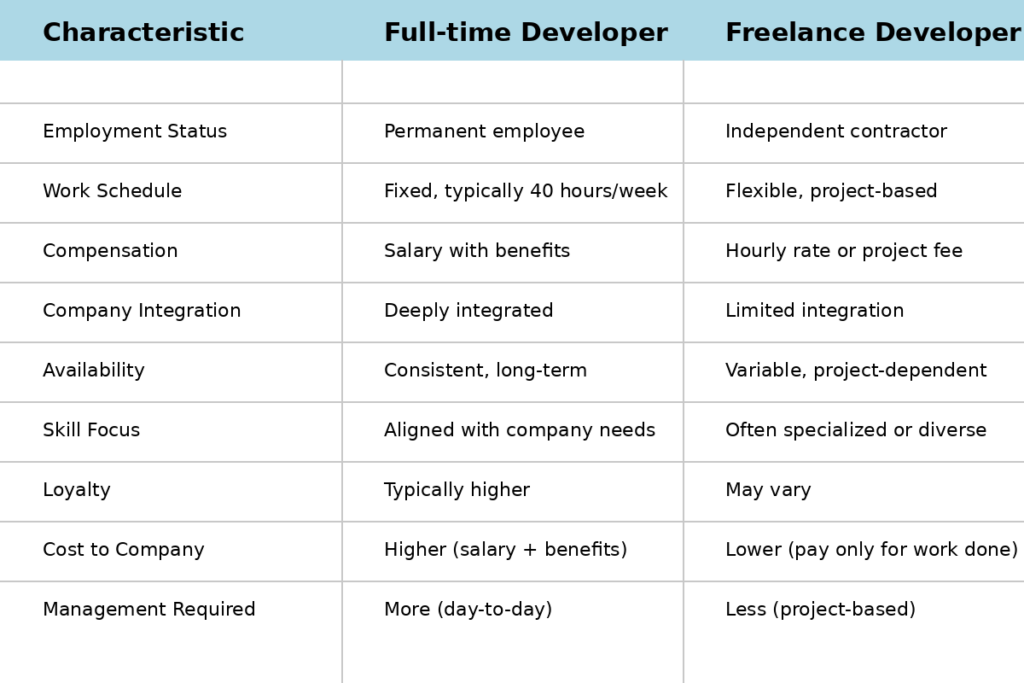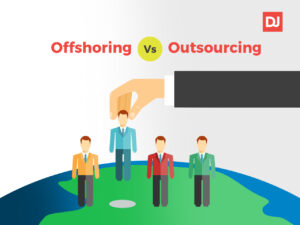As a small business owner or startup founder, every new hire impacts your budget and requires careful consideration of your long-term vision. When it comes to web development, you face a pivotal choice: should you hire a freelance developer or invest in an in-house team member?
Each option offers distinct advantages that can influence your company’s growth trajectory. Freelancers provide flexibility and cost savings for specific projects, while in-house developers foster collaboration and a deeper understanding of your business. It all comes down to weighing your immediate needs against your future goals. Let’s explore how to navigate this important decision and set your company on the path to success.
Full-time Developer vs Freelance Developer – What’s the Difference?
The key difference between a full-time developer and a freelance developer lies in their employment relationship with your company. A full-time developer is a permanent employee who works exclusively for your business, typically with a fixed salary and benefits. They are deeply integrated into your team and company culture. On the other hand, a freelance developer is an independent contractor who works on a project basis or for a set number of hours. They often work for multiple clients simultaneously and have more flexibility in terms of when and how they work.
Here’s a comparison table to illustrate the main differences:

At first glance, securing a freelance web developer might seem to be a pretty attractive option. You can create a one-off business arrangement with no strings attached at an affordable price. And you probably don’t have to mess with HR or shepherd a freelancer through an extensive company onboarding process.
Before making any decision, let’s consider the pros and cons of these two arrangements and see which one is best for your business!
Freelance Web Developer
Freelance web developers are self-employed coders who create websites for different clients and get paid for each project. As independent workers, they set their hourly rates and can work for more clients at the same time.
Let’s have a look at the pros and cons of this type of collaboration:
Pros
#1. Fewer Costs
Rather than on an hourly rate, with a freelancer, you can cut off employment costs. Hiring a freelancer is cheaper for your company because you can cut off health insurance, retirement savings, and benefits. Finally, freelancers get paid on an hourly rate or project-based, which means no overtime costs or holiday expenses.
#2. Flexibility And Independence
Freelancers work on their schedule and organize the work based on deliverables and deadlines. For you, this flexibility means that they can work on more projects at the same time or accommodate different management timelines. In addition, you don’t need to provide the space or tools, just remember them about team meetings or synchronized tasks.
#3. Expertise
Usually, freelancers specialize in very specific elements of web development. If you need support for a specific feature on your website, hiring a freelancer is a good strategy to fill the gap with the necessary skills. Additionally, since freelancers normally work independently, you can skip further training in other areas and constant supervision.
Cons of Freelancing Web Development
At first sight, it might seem like hiring a freelancer is a great idea. However, the cons of hiring a freelance web developer can become significant with time. For example:
#1. Quality Output
Even though a freelancer may claim to have amazing coding and design skills on his portfolio, there’s no real way of knowing if that’s true. It’s usually not practical to test a freelancer’s skills, and you may not discover any knowledge gaps until the project is already in full swing.
Also, it’s impossible to know whether a freelancer has the most up-to-date technology available, or if they’re using a different coding interface or an older version of communication software. It may sound pedantic, but especially with distributed teams, it can slow the pace of a website’s development. Your freelancer will work more to catch up with tools and software than actually doing the real job.
#2. Not Part of Your Company
As we mentioned earlier, the relationship with a freelancer is usually project-based. They ultimately set their own schedule, meaning that they may prioritize other projects ahead of yours. This can lead to frustrations on your side when it comes to managing times and deadlines.
Company culture is crucial for obtaining quality results for a project. Culture is what makes people feel connected and part of something greater than themselves. It’s what drives commitment.
A freelancer is more likely to provide poor service because they might not feel attached to your company. When working on a project, things go smoothly when all the people involved follow the same processes and share the company’s values.
Trust is also essential. Some freelancers have been known to “flake out” and disappear from a project altogether, leaving it unfinished and in disarray.
#3. Limited Changes
A freelancer may provide only limited post-launch support for a website. So, it may be more difficult to make little tweaks or changes to the site once it goes live. This is especially true if the freelancer has already been paid for the project.
Websites need some time to show results, and changes are part of the job of building a website. If the person doesn’t have a formal work relationship with the company, you might lack the additional support you need after the launch.
In case you need improvements made to the site, your freelancer may not be available to take on the work when you need it. And you will eventually need to start the hiring process all over again. Finding another freelancer could take a lot of time. Your new developer will need to work on someone else’s code. And even the most experienced programmers have difficulties when trying to read other developer’s code. This process takes time, which for you translates into a waste of money – are you sure is it worthed it?
4.Freelance Marketplace Hunt
Finding a qualified freelance web developer is really hard if you don’t personally know someone. You’ll have to go to a freelance marketplace – chaotic platforms where people offer multiple services for low prices just to get a review on their profiles. Looking for web developers who charge cheap salaries means getting cheap results – unless you become a lucky exception.
In House Web- Developer
An in-house web developer is a stable element of your team. It can be a remote position, which doesn’t mean occasional collaboration; it means working from a different location. Being part of your company, an in-house developer follows your culture, HR, and team schedule. When it comes to pros and cons, choosing a remote developer would be a better option for building and maintaining such a valuable asset as a company website.
Pros of Hiring a Full-time Programmer
#1. Accountability
A remote web developer is more accountable for your company simply because they’re essentially full-time team members. They will learn your company’s culture and shared goals and values, as well as work by the same processes.
#2. Skill Set
You can gain a better understanding of their skillset either through pre-hire testing or during their early employment tenure. And over time, you can train them in other vital areas if necessary. When you find a remote web developer with excellent self-discipline, time management skills, and proactive reporting abilities, then you’ll have a valuable company asset for your current project as well as in the future – and remote web developers are way cheaper than hiring a local web developer.
#3. Part of The Team
As a full time employee, a web developer is an active member of your team. If you need further changes like website maintenance or new implementations, the remote developer is already working for you. They are familiar with the site, internal structure, and how things are done in the company.
#5. Hiring a Remote Web Developer
The process of finding and hiring a remote web developer is less complicated. You don’t need to dive into endless lists of people in an online marketplace. You can work with specialized recruiters that know where to find them – like us, DistantJob superheroes. What’s our superpower? You send your job description, and in less than 2 weeks, we’ll send you the resumes of the right candidates for you. The best part? You don’t have to pay until the person starts working with you.
According to the Duke/CIBER Booz Allen study, 70% of companies hire remote workers primarily because of the increased talent pool rather than reduced costs. Also, as I already stated above, more research shows that companies hire remote workers because they experienced how it increased retention, productivity, and commitment.
So if you’re looking overseas for someone to build your website, you should strongly consider forgoing the freelancer route and opting for a remote web developer instead.
Cons
#1. Higher Cost
If freelancers take care of their payroll, a remote web developer is one of your employees. Which means benefits, holidays, HR costs, and so on. Even hiring where living costs are cheaper, a full-time employee is always more expensive. However, you could also call it an investment, since you are hiring someone who will grow with your company and become part of the team.
#2. Limited skill set
This is a significant consideration for small businesses and startups: When hiring an in-house developer, it’s crucial to recognize that a single developer may not possess all the required skills for the diverse projects your business might undertake. The field of web development is vast, encompassing various specializations such as front-end design, back-end programming, database management, and cybersecurity. Moreover, technology in this field evolves at a rapid pace, making it challenging for one person to stay current in all areas. As a result, additional training or external help is often necessary for specialized tasks or when implementing new technologies. This limitation can lead to project delays or increased costs when facing unfamiliar technical challenges. Ultimately, relying solely on one in-house developer may restrict your ability to take on diverse or complex web projects, potentially limiting your business’s growth and adaptability in the digital space.
If you still want to know more about these two different models, watch this video where I share some insights on hiring freelancers vs. hiring full-time remote employees.
Which One Is Right For Your Business?
For many small businesses and startups, starting with a freelancer can be a good way to test the waters. It allows you to get your web presence up and running without a significant long-term commitment. As your business grows and your web development needs become more consistent, transitioning to an in-house developer might make more sense.
Alternatively, if you have complex, ongoing web development needs from the start and the budget to support them, hiring an in-house developer could be the right move to ensure your web presence grows alongside your business.
Remember, there’s no one-size-fits-all solution. Carefully consider your specific needs, goals, and resources to make the best decision for your business.
And if you need a better, less time-consuming, and less costly process than screening online marketplaces and having specialized recruiters who headhunt developers and take care of the dirty (and boring) work, look no further. We can help! Just contact us, and we will find the best remote web developer for your team!





